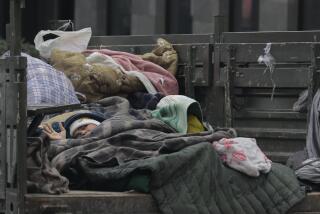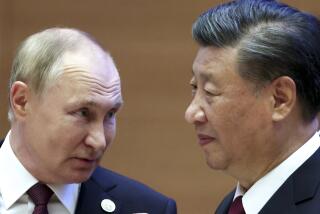NEWS ANALYSIS : Lithuania, Not Azerbaijan, Gorbachev’s Top Problem
- Share via
WASHINGTON — Soviet President Mikhail S. Gorbachev is unlikely to be hurt in the short run by the violent ethnic crisis in Azerbaijan, U.S. and British analysts said Tuesday. But Lithuania’s threatened secession represents a serious threat to Gorbachev and his reforms.
“Azerbaijan is not a danger to the system that Lithuania is,” said Arnold Horelick, director of Soviet studies at the RAND Corp. “It might be if he is incapable of suppressing it, but he doesn’t risk its spread, except perhaps to (other Muslim regions of) Central Asia.”
Lithuania, by contrast, presents Gorbachev with two unpalatable courses of action, said Horelick, who was formerly the CIA’s top Soviet analyst.
“With Lithuania, use of force would end perestroika, end the current Soviet foreign policy,” Horelick said. “But the precedent of Lithuanian secession would be picked up by the other Baltic states, Georgia, maybe others. It could lead to dissolution of the empire.”
Gorbachev’s enormous burdens, aggravated by both Azerbaijan and Lithuania, appear to be taking their toll on him personally as well as politically. A U.S. government official, who asked not to be further identified, presented the pessimistic view.
“He is still in charge, still the man with the steel teeth,” this official said. “But his long-term prospects, at this point, do not look very good. He is in the early phase of what we call the breaking point.
“Gorbachev has lost touch with his long-term strategy,” the official continued. “He is now preoccupied with patching together reactions to day-to-day and hour-by-hour emergencies. He has lost the hard edge in controlling the pace and direction of perestroika. “
Most non-government as well as government experts are less gloomy. Many of them worry about the “emotional overload” reflected in reports of Gorbachev’s ill-tempered outbursts at critical editors and legislators and even during man-in-the-street encounters. He has also threatened several times to quit.
But given the enormous pressure he is under, most acknowledge that Gorbachev still shows what one expert called “remarkable composure.”
No reputable expert on Soviet affairs is predicting on the record that Gorbachev’s days are numbered. “Not even within the intelligence community,” one source said.
The bloody Azerbaijani-Armenian fighting, latest in centuries of ethnic conflict over the same disputed territory, is rooted in both class and religious differences.
“Armenians in Baku, the Azerbaijan capital, tend to be middle-class merchants, entrepreneurs, employers,” said Michigan University’s Ronald G. Suny, an expert on Soviet Central Asia. “Azerbaijanis have been working-class, resenting them.”
Also, Armenians are Christian with a long cultural tradition. The Azerbaijanis are Shiite Muslims.
Giving the crisis international overtones, about 6 million Azerbaijanis live in Azerbaijan but another 9 million live in neighboring Iran. Some Azerbaijani demonstrators have called for independence, others for unification across the border, although the Iranian government has made no move to encourage secession. Nearby Turkey may also become a player, because the Azerbaijanis are a Turkish people.
Age-Old Enmities
The conflict between the Azerbaijanis and Armenians is not the only, but probably the worst, of the many age-old ethnic enmities among the more than 100 peoples that make up the Soviet Union. If it is not controlled, experts consider other outbreaks likely elsewhere.
Suny said Gorbachev’s perestroika reforms were in danger of collapsing into chaos and anarchy until the Soviet leader ordered troops into Azerbaijan on Monday.
“This was the point where Gorbachev had to show his iron teeth,” Suny said. “He may have to discard the methods of perestroika to preserve the goals of perestroika. “
By sending the Soviet military to restore order, some analysts say, Gorbachev eroded a key pillar of his perestroika philosophy--that economic, political and national differences can be resolved by peaceful, democratic means. Suny maintained that “after these events, it is no longer possible to argue that you can reform this multinational empire without violence.”
Other experts disagree. They argue that Gorbachev may actually win praise from Soviet conservatives in the short term for showing that he was willing to use force in Azerbaijan to maintain law and order, an issue of growing importance in the country.
“He must be careful, of course, that excessive force is not used,” said a senior U.S. official. “But so far, I don’t see the Azerbaijan situation worsening his political situation in Moscow very much.”
In the medium term, however, according to Princeton Sovietologist Stephen Cohen, the risk is that moderates will decide that perestroika is failing and refuse to support the next radical steps Gorbachev may be planning. He may then be forced to dilute his economic and political reforms still further.
In the Baltic republic of Lithuania, in contrast to Azerbaijan, Gorbachev cannot use force to prevent secession without seriously damaging and perhaps killing his perestroika reforms, said Glasgow University’s Alec Nove.
Nove and other experts cite the vast differences between the Caucasus Mountains region, with their longstanding tribal feuds between ethnic groups, and the more Westernized Baltic states, where nonviolent political negotiations about sovereignty are now taking place.
Yet Lithuania’s secession, Nove said, would deal a major, perhaps fatal, blow to Gorbachev and his programs.
“The impact on Gorbachev would be much greater than the territory is worth,” added Stanford’s Alexander Dallin. “There would be a search for scapegoats, for ‘Who lost the Baltics?’ that would be like the ‘Who lost China?’ witch hunts a generation ago in this country.”
Gorbachev’s success in coming party meetings, including a Central Committee session later this month, will be closely watched for signs that his power has weakened, Cohen added. Among other things, those meetings will consider the promised “divorce” legislation that will spell out how republics may legally leave the Soviet Union.
At its congress later this year, the Soviet Communist Party may even split in two, some experts have speculated, with the conservatives and nationalists separating from Gorbachev’s radical reformers.
Gorbachev himself presents the paradox of a leader who is losing control of events in his country even while his position within the ruling Politburo seems secure.
On Gorbachev’s three major fronts, RAND’s Horelick said, he has failed to dampen secessionist sentiment in Lithuania, left the ethnic embers burning in Azerbaijan and backtracked on key economic reforms.
“Everywhere you look, Gorbachev is not managing the forces at work, but another paradox is that the situation is so bad, it’s hard to imagine someone else doing better,” Horelick added. “There is no credible alternative to him, but even if there was, replacing Gorbachev might well make the situation worse, not better.”
Glasgow’s Nove, however, sees a possible alternative--Leningrad party boss Boris Gidaspov, a colorful scientist who initially supported reform but has since come out openly against some of Gorbachev’s programs. But even Nove admitted that it is just a hunch.
Some experts dismiss the view that a single alternative to Gorbachev is needed. If the conservatives decided to remove him, they could resort to a two-man or three-man leadership, much as the troika that initially followed Josef Stalin.
Times staff writer Robin Wright contributed to this story.
More to Read
Sign up for Essential California
The most important California stories and recommendations in your inbox every morning.
You may occasionally receive promotional content from the Los Angeles Times.














